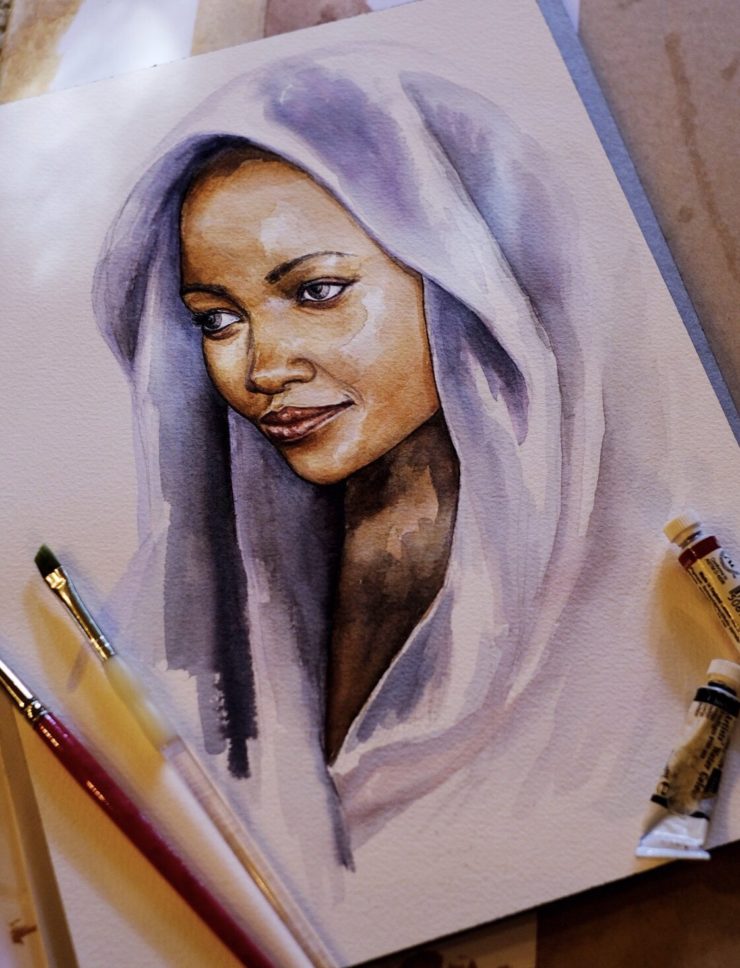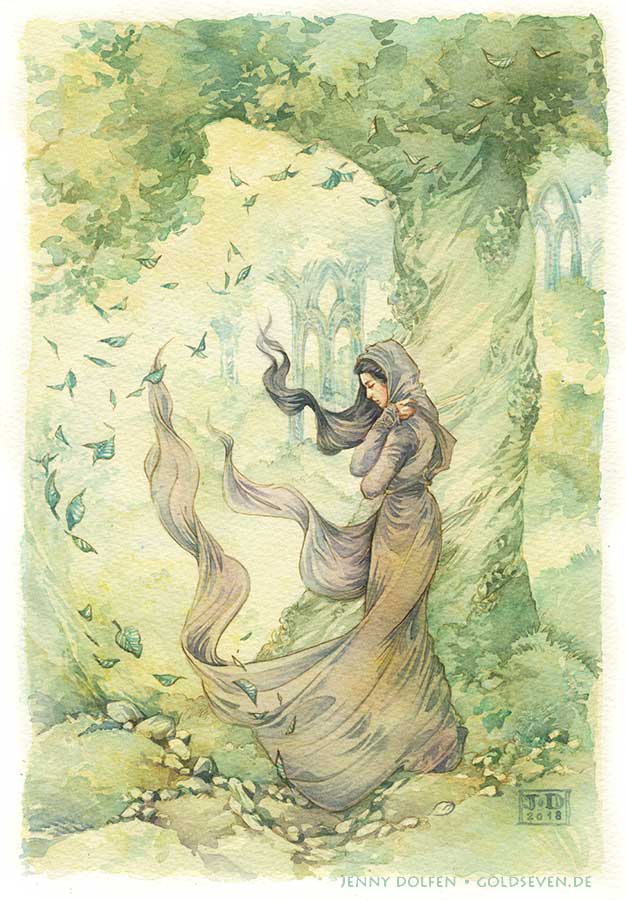In this biweekly series, we’re exploring the evolution of both major and minor figures in Tolkien’s legendarium, tracing the transformations of these characters through drafts and early manuscripts through to the finished work. This week’s installment takes a look at the story of Arwen Undómiel, specifically addressing her special connection to Lúthien Tinúviel.
Arwen Undómiel is well known as the Evenstar of her people and the wife of Aragorn, but for all her significance as a symbol, her role in The Lord of the Rings is shockingly small. Today, we’re going to take a look at the development of her character throughout the drafts of the tale, and we’ll supplement those sources with some of Tolkien’s letters, in trying to finally make sense of Arwen’s place in Middle-earth.
Like many other minor characters, Arwen was a late-comer to The Lord of the Rings. According to Christopher Tolkien, “there is no mention of Arwen” in most of the early drafts of Elrond’s Council (see The Return of the Shadow, hereafter RS, 213 and 365). Even by the time “The Council of Elrond” chapter was all but complete, Arwen was still absent—indeed, most mentions of her in the early chapters of Book II were added significantly later than most of the material (The Treason of Isengard, hereafter TI, 83). Aragorn, significantly, has no love interest to spur his involvement in current events; rather, his motivations are entirely political (TI 84). (Later, of course, Elrond insists that Arwen will not marry a man who is not the king of the reunited regions of Gondor and Arnor, much like King Thingol demands a Silmaril as the bride-price of his daughter Lúthien, Arwen’s ancestor and prototype.)
Arwen has still not appeared by the time Tolkien was drafting “The Paths of the Dead” (The War of the Ring, hereafter WR, 302). Aragorn does receive a message from Elrond through his kindred, along with a black standard, but in this draft it is not crafted by Arwen and no special message accompanies it. In all ways, then, Arwen was an addition in the “later development” of the tale, when Tolkien was doing a lot of re-crafting and revision work (WR 307). In fact, Tolkien himself once admitted that while important and “the highest love-story” (Letters 161), the full tale of Aragorn and Arwen “could not be worked into the main narrative without destroying its structure” (Letters 237). In contrast, the “‘rustic’ love of Sam and his Rosie” was more essential (Letters 161).
Why Arwen, then? What role does she have to play and why does Tolkien seem to sideline her, even silence her? I think we can begin to answer these questions by looking at Arwen’s gradual introduction into the narrative.
The woman who would be Arwen appears for the first time in the second major draft of “The Battle of the Pelennor Fields,” when it is said that Aragorn’s banner was made with gems “by Finduilas Elrond’s daughter” (WR 370). I have elsewhere explored the significance of the name Finduilas; simply put, it is a name of ill omen that suggests a hard life and early death for Elrond’s daughter. The Finduilases of Middle-earth are tragic characters, and they often carry the weight of many wrongs suffered by women. The Finduilas abandoned by Túrin is one example of this. The mother of Boromir and Faramir is also a Finduilas; she dies giving birth to her younger son. So, though there is very little to tell us about the fate Tolkien had in store for this early iteration of Arwen, we would be justified, I think, in assuming it wasn’t a particularly happy one.
Furthermore, at this stage, there is no indication that “Finduilas” and Aragorn are romantically involved. In a scrappy, jotted outline, Tolkien proposes the “coming of Finduilas?” to the coronation of Aragorn, but that is the full extent of the information we’re given. If Tolkien had some idea that the two would marry, it does not make it into his written thoughts at this stage. Instead, we are supposed to “hear of the love of Éowyn [now dead] for Aragorn” during a council meeting (WR 386).
The idea of a relationship between Arwen and Aragorn makes its first appearance in a scrapped note. Here, Tolkien jots down the brief—and instantly rejected—idea that Galadriel will bestow her elven ring on Aragorn, enabling his marriage to “Finduilas” but also giving him “sudden access of power” (WR 425). Tolkien immediately recognized the incompatibility of such an idea, but it is an interesting thought that, as Christopher Tolkien has noted, “raises many more questions than it answers” (WR 425). We could easily lose ourselves in attempting to determine just what that “access of power” might have looked like, but though entertaining, such a line of questioning is ultimately unfruitful, as Tolkien never pursued the thought further.
The name Arwen Undómiel “first emerged in the fair copy of […] ‘Many Partings,’” (Sauron Defeated, hereafter SD, 59). This also seems to be the place in which Tolkien first began to explore the depths of the Aragorn-Arwen relationship, as well as Arwen’s ostensible connection to Lúthien.
Shortly thereafter, the idea that Arwen somehow managed to get Frodo access to the Undying Lands enters Tolkien’s conception. In fact, even the first draft the conversation between the queen and the hobbit is strikingly similar to its final version: though the exact wording changes some, the general ideas remain the same (SD 66-67). What exactly happens in this transaction is strikingly unclear from the scene as it is in The Lord of the Rings. In one letter, Tolkien insists that Frodo is allowed access “by the express gift of Arwen,” (198), but he later complicates this version of the story.
In another letter, Tolkien admits that Arwen managing Frodo’s acceptance to the Undying Lands doesn’t make a lot of sense: “She could not of course just transfer her ticket on the boat like that!” (Letters 327). He clarifies a few lines later, saying that probably “it was Arwen who first thought of sending Frodo into the West, and put in a plea for him to Gandalf (direct or through Galadriel, or both), and she used her own renunciation of the right to go West as an argument” (Letters 327). Gandalf managed it, Tolkien explained, only because of his special status. Arwen would not have promised such a thing to Frodo unless the plan was sure of succeeding, and thus it had to have been in effect for quite some time before she speaks (Letters 328-329). In reality, though, Tolkien is right: someone even of Arwen’s status surely wouldn’t have had the authority to waive the specific terms regarding who is allowed to go West. So in that sense, it certainly isn’t the “express gift of Arwen.” But why does this matter? Why did Tolkien change his mind? I’d argue that it has to do with Arwen’s connection to Lúthien and her relative inaction in the story as a whole.

If Arwen has a defining characteristic in the narrative, it is that she is “the likeness of Lúthien reappeared” (The Peoples of Middle-earth, hereafter PM, 226). Later, the idea that she also shared Lúthien’s fate would emerge with greater clarity (see Letters 180, for example). However, it was important to Tolkien that Arwen was very much a different person. “Arwen is not a ‘re-incarnation’ of Lúthien (that in the view of this mythical history would be impossible, since Lúthien has died like a mortal and left the world of time) but a descendant very like her in looks, character, and fate,” he writes. “When she weds Aragorn (whose love-story elsewhere recounted is not here central and only occasionally referred to) she ‘makes the choice of Lúthien’, so the grief at her parting from Elrond is especially poignant” (Letters 193).
In short, Arwen is not Lúthien. To me, this is the crux of Arwen’s story and the point that we must understand. It can be frustrating at times that Arwen is so much a background character, so relegated to the sidelines, her perspective lost in the other voices of the narrative. But I think that is precisely the point. Arwen and Lúthien may share looks and fate, but they are not alike. Lúthien does not stay hidden away in her father’s home, waiting and sending encouraging messages to her beloved.
Lúthien takes charge of her own fate in a much more striking way than does Arwen. She does not leave Beren to face Sauron and Morgoth alone: instead, she contrives her own means of escape; faces and defeats Sauron and dismantles his haunted isle with the power of her song; saves Beren’s life multiple times; bests Morgoth himself with a power that is otherworldly in its potency—something that no one else in the history of Arda ever managed without the express help of the Valar. And when her beloved is stolen away from her, she goes to the Undying Lands themselves and the enormity of her grief moves impassive Mandos to pity. She literally alters fate though her determination and love.
Arwen frankly doesn’t live up to this legacy, but I don’t think we’re meant to see it as her fault. Instead, I believe that Arwen (and to some extent Elrond) showcases just how drastically the world has changed and how dramatically the influence of the Elves has faded since the days of Lúthien. She may be “the likeness of Lúthien reappeared” (PM 226), but again, she is not Lúthien, and she couldn’t be. For one thing, her mother isn’t a Maia! But more than this: Middle-earth itself has changed. Elves do not have the same power they once had, and, significantly, neither does song. In the days of Lúthien, people very well could—and did—battle in song. Song created physical objects. Song could literally tear down and build up. In the days of Arwen, however, song is an act of remembrance and lament.
Buy the Book


When the Tiger Came Down the Mountain
I mentioned above that Tolkien wrote that because Arwen “‘makes the choice of Lúthien’, […] the grief at her parting from Elrond is especially poignant” (Letters 193). But this seems to be an understatement. Lúthien, unlike Arwen, seems to get a relatively happy ending. She and Beren hide themselves away in their own shining land and live out the rest of their days together in joy.
Arwen, however, is not so lucky. After Aragorn died,
Arwen departed and dwelt alone and widowed in the fading woods of Loth-lórien; and it came to pass for her as Elrond foretold that she would not leave the world until she had lost all for which she had made her choice. But at last she laid herself to rest on the hill of Cerin Amroth, and there was her green grave until the shape of the world was changed. (PM 244)
A slightly later draft adds that “all the days of her life utterly forgotten by Men that came after, and elanor and nifredil bloomed no more east of the Sea” (PM 266).
Whereas Lúthien is remembered in many songs and stories, celebrated by her descendants and lauded as the most beautiful of all the Children of Ilúvatar, Arwen is “utterly forgotten.” (Of course, we should assume this isn’t entirely true, since in the mythos of the story, Frodo and Sam preserve her story in some fashion in the Red Book.)
This leaves so many unanswered questions. Arwen never assumes that Lúthien’s response to death is open to her: she never attempts to petition the Valar for Aragorn’s resurrection. She is more submissive than Lúthien, accepting the sundered fates of herself and her beloved as if they were set in stone. I don’t mean to criticize Arwen. The Valar are, after all, mostly distant from the Middle-earth of The Lord of the Rings, and I don’t expect that many of us would have made a different choice. Rather, I find Arwen’s story tragic, heart-breaking. It is proof of how much the world around her has transformed since the days of her foremother, and a testament to how helpless she must have felt as the world spun around her.
I would say then, that Arwen’s story is very much in her silence. And in that silence we can meet a woman radiant in her sorrow; a woman who stands as witness to the hardships of the world even as she stands in unwavering hope before the face of her joy and love. She might not have the capacity to charge headlong into battle against the Enemy, but she fights back in subtler ways.
Tolkien’s discarded epilogue, in which Sam tells his children stories of the great people far away, is evidence of this. In it, we see an endearing picture of a great queen in whose presence the humble hobbits are honored and celebrated. Many times, Sam speaks fondly and gratefully of the beautiful queen’s gentle interactions with his children. And so I think that Arwen, in her way, finds and creates happiness and hope even as her life is a constant reminder of all she will one day lose. There is strength there, of a different kind than that of Lúthien, but strength all the same.
Megan N. Fontenot is a dedicated Tolkien scholar and fan who has been abundantly encouraged and inspired by the examples and influence of Tolkien’s characters. Catch her on Twitter @MeganNFontenot1 and feel free to request a favorite character while you’re there!










